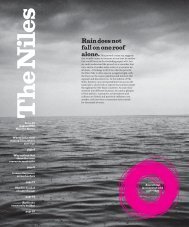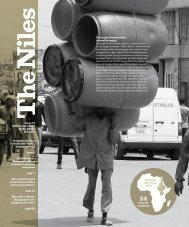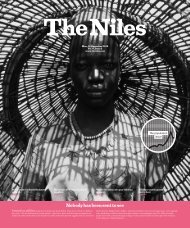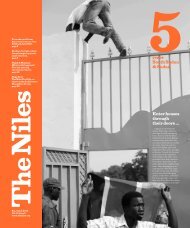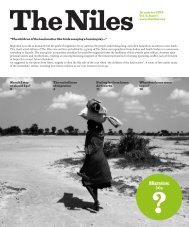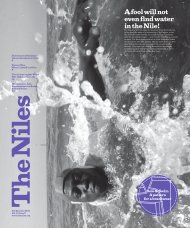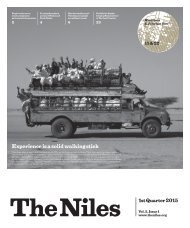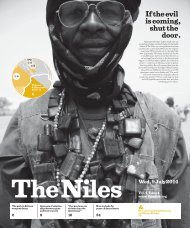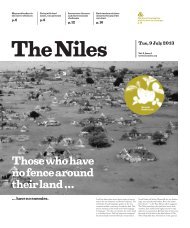When deeds speak, words are nothing
Speaking about sustainable development is easy. Acting sustainably is another matter. And now the evidence is unequivocal: Mankind’s impact on nature is causing the climate to change rapidly and drastically, threatening the environment and the very resources we need to survive. Aware that humanity is careening close to the edge, The Niles correspondents set out to explore where and how people in the Nile Basin region rethink. So much of their findings for now: We are an endlessly innovative species. Cooperation is our superpower. When deeds speak, words are nothing.
Speaking about sustainable development is easy. Acting sustainably is another matter. And now the evidence is unequivocal: Mankind’s impact on nature is causing the climate to change rapidly and drastically, threatening the environment and the very resources we need to survive. Aware that humanity is careening close to the edge, The Niles correspondents set out to explore where and how people in the Nile Basin region rethink. So much of their findings for now: We are an endlessly innovative species. Cooperation is our superpower. When deeds speak, words are nothing.
You also want an ePaper? Increase the reach of your titles
YUMPU automatically turns print PDFs into web optimized ePapers that Google loves.
The media needs to air more perspectives
and tighten its links to scientists
to protect valuable natural resources,
comments Henry Lutaaya.
Henry Lutaaya
Kampala, Uganda
“Reflect the
complexity
of the river
basin and
its ecosystem.”
#NileCooperation
#NileBasin
#OneNile
#UnityInDiversity
“Nationalistic
sentiments have
triggered divisions
and conflict.”
For example, under the Cooperative
Framework Agreement (CFA), which seeks
to establish a permanent body to oversee the
shared water resources, there is a deliberate
effort to replace such absolute rights and
notions as ‘equitable rights’ or water use
allocations, with the more inclusive terms
such as “promoting integrated management,
sustainable development, and harmonious
utilisation of the water resources of the
Nile Basin”.
Sharing resources, sharing benefits
Since the Nile is a shared resource and a
fragile one, its utilisation requires joint efforts
towards sustainability. Researchers and governments
technocrats have moved the debate
from sharing the resource to sharing the
benefits in recent years.
As Michael Kizza, the Deputy Executive
Director of the Nile Basin Initiative (NBI), points
out, the basin is characterised by considerable
variabilities in rainfall, climate and geography,
causing flooding and erosion.
“Most of the water in the Nile comes
from upstream countries, while downstream
countries receive very little rainfall. Even the
upstream countries that receive a lot of rain
experience shortages of water during the dry
season. Many of the challenges that face the
member countries of the Nile, such as flooding,
high population growth, and economic growth,
are transboundary in nature. So for each country
to operate on its own to solve its problems
will not result in the best solutions.”
Approaches like sharing the resource in
absolute terms have created competition over
the river and undermined its ability to keep
up with the ever-growing pressure of meeting
the demands of the bulging population.
For countries to sustainably manage the
resource, Kizza argues, governments have
shifted focus on supporting projects that seek
to extend the benefits of the river beyond
national boundaries.
Projects such as the power interconnection
lines between Uganda, Rwanda and the
Democratic Republic of Congo (DRC), or the
joint fisheries protection patrols conducted
between Uganda and DRC on Lake Albert and
George, are better alternatives. They save resources
that would have been invested if each
country had established its own projects and
because sharing benefits promotes peace.
Sowedi Ssewagudde, the Commissioner
for Transboundary Affairs in Uganda’s Ministry
of Water and Environment, says: “We note
that different countries have different comparative
advantages. For example, you may find
that a country upstream may have more fertile
land, that even if you applied a small amount
of water, it might be more productive than
irrigation in the desert. Of course, we understand
the different sentiments among our partners
in terms of being self-reliant. But we are also
promoting the idea that a given country can,
for example, invest in the production of food
in another country, export it, and only pay taxes
in the country where you’re growing.”
Therefore, in rethinking investments, media
practitioners may need to understand these
concepts, appreciate the benefits, and promote
debate among the population on the best way
to share benefits and costs of cooperation.
Rethinking voices
Studies on how media outlets report events
about the Nile Basin suggest that the media
have not done an excellent job of balancing the
voices of stakeholders.
While presenting a recent study on how
media captured the voices in reporting the
Nile issues during the 6th NBDF, Fantini noted
that overwhelmingly, the press had given
government officials and technocrats more
space than other stakeholders. “Voices count.
But very often, the voices of the ordinary people
are either silenced, or they are categorised
as having grievances, not solutions.”
Fredrick Mugira, the co-founder of the investigative
multimedia online platform Info-
Nile, goes a step further when he says that
reliance on the official government statements
is often the source of nationalistic sentiments
and speculation, as opposed to professional
balanced and objective reports.
Embracing knowledge
Meanwhile, many journalists in most media
outlets across the Nile Basin overwhelmingly
depend on official statements for news, which
many say propagates nationalistic sentiments
and state propaganda while obscuring the
knowledge and experiences of the experts and
people on the ground.
For Fantini, the media need to start interviewing
people based on their background. “Instead
of inviting people based on their passport,
why not interview people based on their background?
Every time we talk about the Nile, we
should have an anthropologist, a hydrologist or
a social scientist to reflect the complexity of the
river basin and its ecosystem.”
InfoNile’s Fredrick Mugira says that close
ties between journalists and scientists enrich
stories and conversations. “It is from scientists
that you can get objective findings of events. Journalists
need to cultivate tighter relationships with
scientists who are generators of this knowledge.”
45









